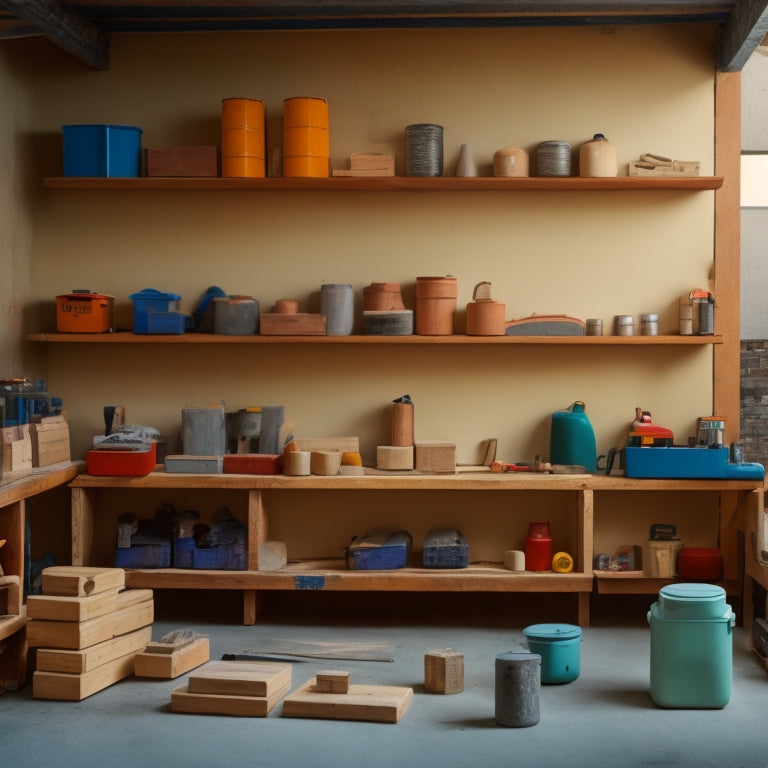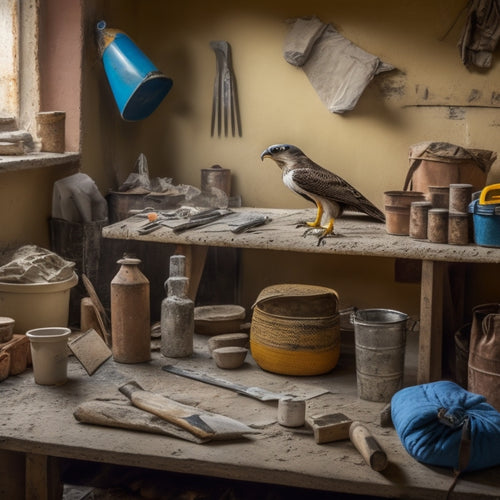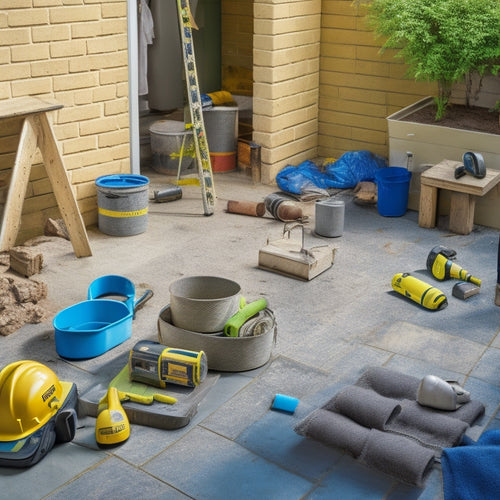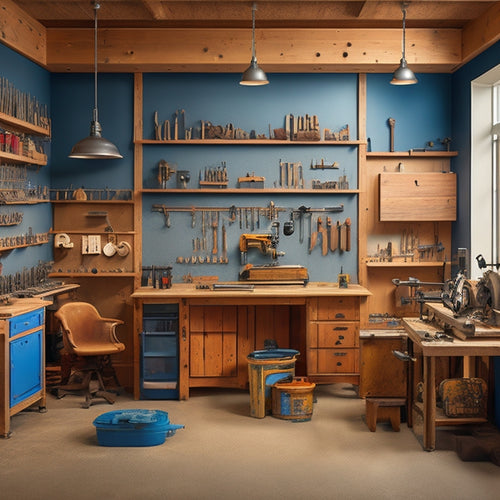
7 Best Blocks to Buy for Home Renovation
Share
When planning your home renovation, you'll want to select blocks that balance structural integrity, energy efficiency, and cost-effectiveness. Cinder blocks, concrete masonry units (CMUs), and insulated concrete blocks are top contenders, offering varying levels of strength, durability, and thermal performance. Hollow concrete blocks provide a cost-effective option for non-load-bearing applications, while interlocking blocks guarantee structural stability. Solid concrete blocks boast exceptional durability and weather resistance. Consider factors like compressive strength, block density, and surface texture when making your decision. By weighing these factors, you'll uncover the perfect blocks for your project, and discover even more benefits that can elevate your renovation.
Key Takeaways
• Consider compressive strength, block density, and surface texture when selecting blocks for home renovation to ensure structural integrity and quality.
• Insulated concrete blocks and CMUs are top choices for energy efficiency and durability in home renovation projects.
• Budget-friendly options like cinder blocks, ICFs, and recycled materials offer cost-effective solutions without compromising quality.
• Choose block sizes based on project requirements, with standard dimensions ranging from 8x8x16 inches to larger sizes for commercial applications.
• Research local suppliers and regional availability to ensure timely delivery and avoid project delays, considering factors like market demand and supplier relationships.
Cinder Block Quality Factors
When selecting cinder blocks for your home renovation project, you should consider several key quality factors that impact their durability, strength, and overall performance.
One important aspect is the type of cinder block you choose. There are various types, including solid, hollow, and insulated blocks. Cinder block insulation, in particular, is necessary for energy efficiency and can greatly reduce heat transfer. You'll want to select blocks with adequate insulation to guarantee your building remains comfortable and energy-efficient.
Another essential quality factor is the block's compressive strength, which determines its ability to withstand weight and pressure. Look for blocks with a high compressive strength rating, typically measured in pounds per square inch (psi).
Additionally, consider the block's density, which affects its thermal mass and ability to regulate interior temperatures. You should also inspect the block's surface texture, as a smooth finish can improve mortar adhesion and overall structural integrity.
Budget-Friendly Block Options
When renovating your home, you're likely looking for ways to stay within budget without sacrificing quality.
Fortunately, there are budget-friendly block options available that can help you achieve your goals.
Affordable Material Options
You'll find that budget-friendly block options abound in materials like concrete masonry units (CMUs), cinder blocks, and insulating concrete forms (ICFs), which offer a cost-effective alternative to pricier materials without sacrificing durability or structural integrity.
These affordable options are ideal for homeowners on a tight budget, allowing you to achieve your renovation goals without breaking the bank. Plus, many of these materials can be sourced from recycled materials, making them an eco-friendly option for environmentally conscious homeowners.
When selecting affordable materials, consider the specific requirements of your project. For instance, CMUs are suitable for load-bearing walls and foundations, while cinder blocks are better suited for non-load bearing applications.
ICFs, on the other hand, provide excellent insulation and can be used for both foundation and above-grade construction. By choosing the right affordable material for your project, you can enjoy significant cost savings without compromising on quality or performance.
Cost-Effective Alternatives Found
Beyond traditional materials, budget-friendly block options like recycled concrete blocks, fly ash blocks, and autoclaved aerated concrete (AAC) blocks offer cost-effective alternatives for your home renovation project.
You might be surprised to learn that these sustainable materials can greatly reduce your construction costs without compromising on quality. Recycled concrete blocks, for instance, are made from reclaimed concrete waste, reducing the need for virgin materials. Fly ash blocks, on the other hand, are manufactured from industrial waste, making them an eco-friendly choice. AAC blocks, meanwhile, boast exceptional thermal insulation properties, reducing the need for additional insulation materials.
When it comes to DIY techniques, these blocks are relatively easy to work with, allowing you to take a hands-on approach to your renovation project. With the right tools and expertise, you can lay these blocks with ease, saving on labor costs.
Additionally, many of these blocks come with pre-drilled holes, making installation a breeze. By choosing these budget-friendly block options, you can achieve your desired renovation results while keeping costs in check.
Price-Friendly Block Choices
Explore a range of price-friendly block choices that cater to different budgets and renovation requirements, from hollow concrete blocks to interlocking blocks and concrete masonry units.
You'll find that each option offers unique benefits, so it's crucial to evaluate your specific needs and perform a price comparison to determine the best value for your money.
Hollow concrete blocks, for instance, are a cost-effective option for non-load bearing walls, while interlocking blocks provide additional structural integrity and can be used for both load-bearing and non-load-bearing applications.
Concrete masonry units, on the other hand, offer superior strength and durability, making them ideal for foundations, walls, and other structural elements.
When evaluating these options, don't forget to reflect on block aesthetics, as the right choice can enhance your home's visual appeal.
Insulated Concrete Blocks
Insulated concrete blocks, comprising a foam board or fiberglass core sandwiched between two layers of concrete, offer enhanced thermal performance and energy efficiency in home renovations. As you consider insulated concrete blocks for your project, you'll benefit from their ability to reduce heat transfer and energy loss. This is particularly important in extreme climates, where temperature fluctuations can greatly impact your energy bills.
Here's a breakdown of the advantages of insulated concrete blocks:
| Feature | Benefit | Impact on Your Project |
|---|---|---|
| Thermal Mass | Regulates interior temperature | Reduces temperature fluctuations |
| Energy Efficiency | Minimizes heat loss | Lowers energy bills |
| Durability | Resists weathering and erosion | Increases block lifespan |
| Sound Absorption | Reduces noise pollution | Enhances indoor comfort |
Solid Concrete Blocks Benefits
When you choose solid concrete blocks for your home renovation, you'll appreciate their exceptional durability and strength.
You'll also benefit from lower maintenance costs over time, as these blocks are resistant to damage and require minimal upkeep.
Durability and Strength
Solid concrete blocks boast exceptional durability and strength, withstanding harsh environmental conditions and supporting heavy loads without compromising their structural integrity. When you choose solid concrete blocks for your home renovation, you can trust that they'll perform well under pressure.
Here are just a few reasons why solid concrete blocks stand out for their durability and strength:
-
Block weather resistance: Solid concrete blocks can withstand extreme temperatures, heavy rainfall, and even natural disasters like earthquakes and hurricanes.
-
Block load capacity: These blocks can support heavy loads, making them ideal for building foundations, walls, and structures that need to bear weight.
-
Solid concrete blocks are resistant to pests and rodents, reducing the risk of damage and infestation.
- They're also non-combustible, meaning they won't catch fire or spread flames in the event of a house fire.
Low Maintenance Cost
You'll appreciate the cost savings that come with using solid concrete blocks, which require minimal upkeep and repair, thereby reducing your long-term maintenance expenses. This means you'll spend less on repairs and replacements, freeing up your budget for other important aspects of your home renovation project.
Additionally, solid concrete blocks are energy efficient, which translates to lower energy bills and a reduced carbon footprint. This energy efficiency also contributes to long-term savings, as you'll be using less energy to heat and cool your home.
Another benefit of solid concrete blocks is their resistance to pests and mold, which reduces the risk of costly infestations and damage. Moreover, their dense composition makes them less prone to water damage, which can be a significant expense.
Block Sizes for Different Projects
For various home renovation projects, choosing the right block size is essential, as it directly impacts the structural integrity, aesthetic appeal, and cost-effectiveness of the final result. You'll want to take into account the specific requirements of your project to select the most suitable block size. A block size guide can help you determine the ideal block size for your project's unique needs.
Here are some general guidelines to keep in mind:
-
Small blocks (10-12 inches): Ideal for small-scale projects, such as garden walls or patios, where a more rustic, textured look is desired.
-
Medium blocks (14-16 inches): Suitable for most residential projects, including foundation walls, retaining walls, and decorative features.
-
Large blocks (18-20 inches): Best for commercial or industrial projects, or for creating dramatic, imposing structures.
- Extra-large blocks (22 inches or larger): Reserved for massive, high-impact projects, such as highway construction or monumental architecture.
When selecting a block size, take into account factors like load-bearing capacity, drainage, and visual appeal to ascertain your project meets its full potential.
Regional Block Availability Matters
When planning your home renovation project, it's vital to take into account the regional block availability, as it greatly impacts the project's timeline, budget, and overall feasibility.
You'll want to research local suppliers and their inventory to guarantee the blocks you need are readily available. Regional preferences also come into play, as certain types of blocks might be more popular or accessible in your area than others. For instance, if you're in a region prone to natural disasters, you may want to opt for blocks that offer enhanced durability and resistance.
It's essential to understand the local market demand and supply chain to avoid project delays or cost overruns. By doing so, you can make informed decisions about the type and quantity of blocks to purchase.
Additionally, building relationships with local suppliers can lead to better pricing, faster delivery, and access to expert advice.
Don't underestimate the importance of regional block availability – it can make or break your renovation project. By being proactive and doing your research, you can guarantee a smoother, more successful project outcome.
Block Cost Vs Durability Tradeoff
Every homeowner must weigh the block cost against its durability, as a higher upfront investment can yield significant long-term savings and reduced maintenance needs.
This cost analysis is essential, as it helps you determine whether the initial expense will pay off in the long run. Durability testing can provide valuable insights into a block's performance, allowing you to make an informed decision.
When evaluating blocks, consider the following factors:
-
Material quality: High-quality materials may be more expensive, but they'll withstand the elements and last longer.
-
Manufacturing process: Blocks made using advanced manufacturing techniques may be more durable and require less maintenance.
-
Warranty and certifications: Look for blocks with extended warranties and certifications from reputable organizations, such as the International Association of Certified Home Inspectors.
- Maintenance requirements: Some blocks may require more frequent maintenance, which can increase costs over time.
Frequently Asked Questions
Can I Use Blocks for Outdoor Decorative Projects Like Planters?
You're wondering if blocks are suitable for outdoor decorative projects like planters. The answer is yes, you can use blocks to create stunning outdoor aesthetics.
They're ideal for planter designs, as they're durable, low-maintenance, and can withstand harsh weather conditions.
By choosing the right type of block, you'll achieve a beautiful, long-lasting planter that complements your outdoor space.
Just make sure you select blocks resistant to freeze-thaw cycles and moisture damage to guarantee a successful project.
Do I Need Special Tools to Cut Concrete Blocks?
Did you know that the global concrete block market is projected to reach $4.5 billion by 2025?
When it comes to cutting concrete blocks, you'll need the right tools and techniques. You'll have to decide between dry-cutting or wet-cutting techniques, depending on your project's needs.
For tool options, consider a masonry saw, circular saw, or a hammer and chisel. You might also invest in a diamond blade or a block splitter for more precise cuts.
Research each option to determine the best fit for your project's specific requirements.
Are Concrete Blocks Suitable for Building a Backyard Fireplace?
When building a backyard fireplace, you'll wonder if concrete blocks are suitable. The answer is yes, but you'll need to contemplate the fireplace design and heat retention.
Concrete blocks can withstand high temperatures, but they may not retain heat as well as other materials. You'll need to balance aesthetics with functionality, ensuring your design allows for efficient airflow and heat distribution.
With proper planning, concrete blocks can be a great choice for your outdoor fireplace project.
Can I Paint or Stain Concrete Blocks for Aesthetic Appeal?
You can definitely paint or stain concrete blocks to enhance their aesthetic appeal.
Before doing so, make certain you prepare the surface properly by cleaning and etching the blocks to create a rough texture for better paint adhesion.
Then, choose from a wide range of color options to match your desired style.
Remember to apply a primer and a coat of paint specifically designed for concrete to achieve a durable, long-lasting finish.
Are Blocks a Good Choice for Building a Retaining Wall?
When building a retaining wall, you're likely wondering if blocks are a good choice.
The answer lies in block durability. Since retaining walls bear significant loads, you need blocks that can withstand pressure and harsh weather conditions.
Look for blocks with high compressive strength, low water absorption, and resistance to freeze-thaw cycles.
With the right blocks, you'll guarantee a stable and long-lasting retaining wall that can handle the weight and forces acting upon it.
Conclusion
As you stand in your half-demolished home, surrounded by dust and debris, the right blocks can be the foundation of a successful renovation.
Imagine the satisfaction of watching your project take shape, block by block, like a puzzle coming together.
By choosing from the top 7 blocks outlined above, you'll build a strong, durable, and cost-effective structure that will withstand the test of time.
With the right blocks, your dream home will rise from the rubble, a true masterpiece of renovation.
Related Posts
-

Top Tools for DIY Home Renovation Plastering Success
To achieve DIY home renovation plastering success, you'll need a range of essential tools. Start with hand tools like...
-

7 Patio Safety Tips for DIY Renovation Projects
As you begin your DIY patio renovation project, prioritize safety by evaluating the worksite for tripping hazards and...
-

Renovation Tool Checklist for Smooth Finishes
When tackling a renovation project that requires a smooth finish, you'll need a thorough tool checklist to guarantee ...


